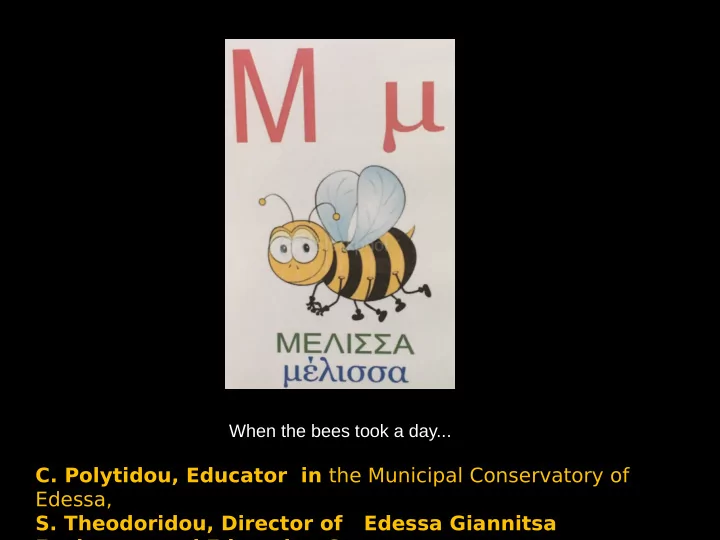

When the bees took a day... C. Polytidou, Educator in the Municipal Conservatory of Edessa, S. Theodoridou, Director of Edessa Giannitsa Environmental Education Centre
IT CONSERNS… AND THE PURPOSE WAS… It concerns an educational program that was held for fjfty kindergarten and elementary school pupils during a non formal approach. The purpose of the interventions was the environmental literacy of the trainees in relation to climate change. Specifjcally, the research interest of the scholars was focused on the resonance that a learning intervention would have for the understanding of such a serious environmental problem by children of pre-school age. The aforementioned purpose was approached having as a learning object the efgect of climate change on the pollination of peach trees by bees.
PHASES OF THE PROJECT • 1st phase: Conceptual approach of the concepts "Seasons", "Melissa"/Duration 7’ /discussion-post modernism. This was done through the investigation of the pre-existing experiences of the pupils (initial/diagnostic evaluation) on the weather phenomena and the fmowering stages of the peach, always in correspondence with the seasons of the year. • Phase two: Pollination. Bees at work fair weather the season of spring/Duration 5 ̂/Psychokinetic game with soundscape-modernist phase. In other words, the pollination stage was simulated with weather regularity. • Phase 3: Fruiting. Bees at work with fair weather/Duration 5 ̂/Psychokinetic game with soundscape- modernism • Phase 4: Continuous rainfall during the pollination period. Bees out of work due to bad weather/Duration 5 ̂/Psychokinetic game with soundscape- post modernism. In other words, the pollination stage was simulated with non- meteorological regularity. • 5th phase: Acargia/Duration 8 ̂/Discussion on the impacts of climate change, through references to experiences and experience of each student involved-. post modernism. In particular, they occupied the student groups, comparatively, the consequences of the fjrst and second indents. • 6th phase: Evaluation
45’ Programme of Action In particular, during the realization of our reference program, elements of music-kinetic education and acoustic ecology were utilized. The learning scenario followed was semi-directed. During its development, soundscapes were created using sound sources of useless materials. Among the learning methods applied were role-playing, psychomotor games, the production of original discourse, the expression through painting, the craftsmanship. In particular, the learning process was applied to pre-school students and first class students. It concerned the approach of the concept of "climate change“. The intervention took place in collaboration with the 50 students of the CCECs -Kindergarten "Colorful Tree" and the Municipal Conservatory of Edessa. February-March 2019.
Worth mentioning… Worth mentioning… …is the imaginative and original educational script, which facilitated the understanding and appropriation of the word "E PI KO NIA SI" – means pollination- through its speech in Greek, using voices from Animals: "bE" sheep, "PI" duckling, "KO" hen, "NIA" cat, "SI" snake. Thus, in a "tangible" way, the trainees approached climate change through its efgects.
…Evaluation Results- Discussion • During the evaluation phase, the method of discussion was used. During the period of discussion, the questions submitted by the teacher, contained Bloom’s T axonomy’s verbs–also known as power verbs or thinking verbs–. They are ofgered /are suitable to be used for personalizing and difgerentiating learning. • Bloom’s T axonomy’s verbs categorized in, Knowledge, Understand, Apply, Analyze, Evaluate, Create * According to the demographic data of the trainees, 70% of them come from rural families active in the cultivation of peach trees, while 100% reside next to agricultural peach plantations. Outnumber girls (60%) compared to boys (40%).
…Evaluation Results- Discussion The results obtained concerned: • • 80% of pupils were recorded with a positive sign in the acquisition of new knowledge about the pollination process • • 65% of pupils were recorded with a positive sign in the conquest of new knowledge on climate change • • 55% of pupils were recorded with a positive sign in the understanding of pollination as a compulsory process that precedes fruiting for the peach tree • • 58% of pupils were recorded with a positive sign in understanding the connection of weather events to the seasons in which they appear (general approach) • • 52% of pupils were recorded with a positive sign in the use of new knowledge to understand their own everyday life. • • 41% of pupils were recorded with a positive sign of the understanding of climate change and the elements that identify it • • 25% of pupils were recorded with a positive sign in the assessment/critical approach of climate change as a problem • • 12% of pupils were recorded with a positive sign in the ability to understand the need to fjnd a solution and seek it out.
…Evaluation Conclusions • A pyramid development was observed with respect to the percentages of the learning outcomes, equivalent to that of the Bloom’s T axonomy’s verbs. • Once again it has been confjrmed that environmental literacy requires that educational processes be systematically repeated over time. • The positive response of young children of preschool age to this study is ofgered for recovery. This can be done through expanding the study into larger numerical groups of peers. Thus, the indication recorded in relation to the literacy of children is studied in depth in order to provide answers on the subject that will be characterized by validity and reliability in the generalisation of the above conclusions.
Σας ευχαριστούμε (... thank you)!!!
Recommend
More recommend